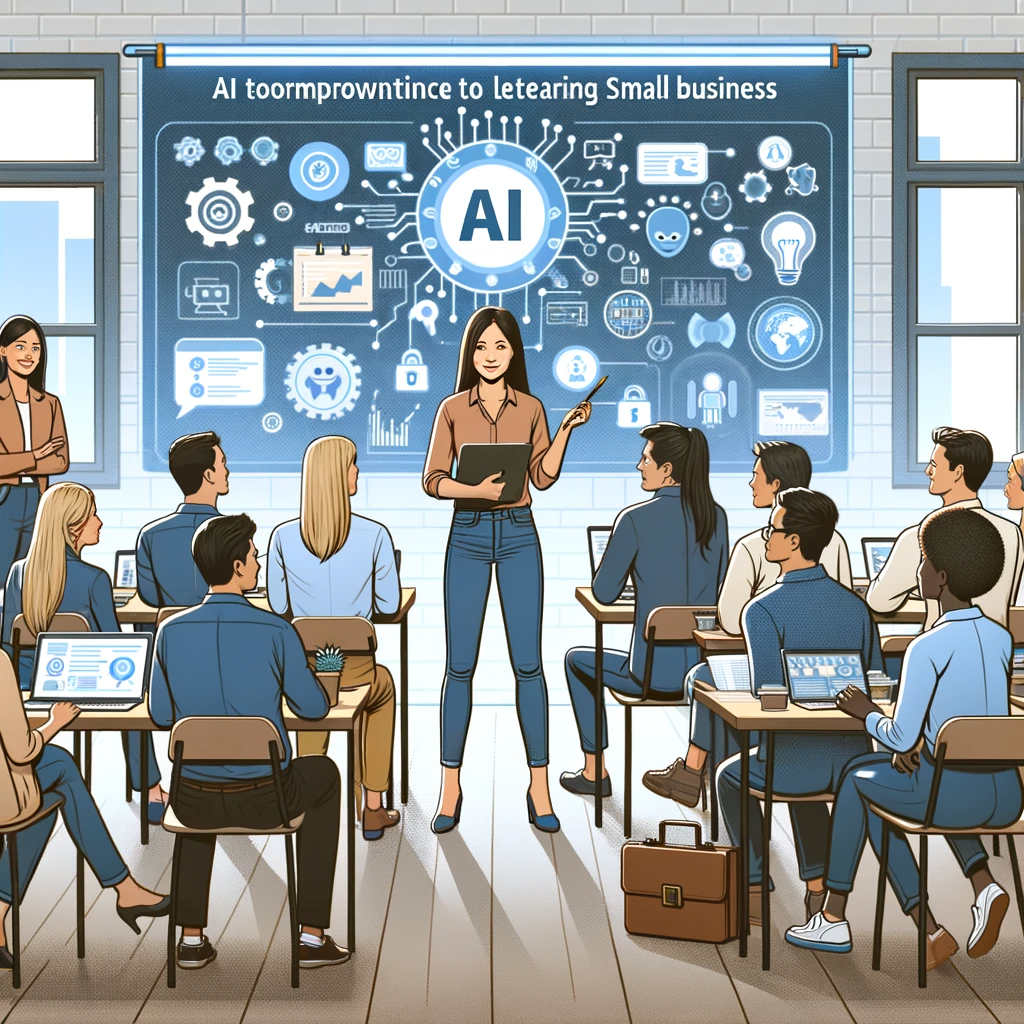Small businesses are the lifeblood of economies worldwide. They drive innovation, provide employment opportunities, and contribute significantly to local communities. In recent years, the landscape for these enterprises has been evolving rapidly, largely due to the transformative power of Artificial Intelligence (AI). As AI continues to permeate various industries, the question that arises is whether it is a threat that could potentially disrupt traditional small business operations or a savior that offers unprecedented opportunities for growth and efficiency.
The growing role of AI in today’s world cannot be overstated. From predictive analytics to chatbots that enhance customer service, AI technologies are reshaping how businesses operate. Large corporations have been quick to embrace AI, reaping its benefits in terms of cost reduction and improved decision-making. However, for small businesses with limited resources, the adoption of AI presents a unique set of challenges and opportunities.
In this article, we delve into the complex relationship between AI and small businesses, aiming to address the central question: Is AI a threat or a savior for these enterprises? To provide a comprehensive understanding, we will explore various facets, including the impact of AI on small businesses, the challenges they face, the opportunities they can harness, and real-world examples that illustrate the dynamics at play.
Through this exploration, we hope to shed light on the path forward for small businesses in an AI-driven world, recognizing both the potential pitfalls and the promising avenues for growth and success. Small businesses stand at a crossroads, and the choices they make regarding AI adoption will play a pivotal role in shaping their future.
The Growing Role of Small Businesses

Small businesses are the backbone of economies at both local and global levels. These enterprises, often characterized by their limited size, workforce, and operational scale, play a vital role in fostering economic growth and providing a diverse range of products and services to communities. In essence, small businesses are the heartbeat of entrepreneurship and innovation.
One of the key aspects of small businesses is their profound impact on local economies. They contribute to job creation, often serving as the primary source of employment in communities. Moreover, they stimulate economic activity by sourcing goods and services locally, which can lead to a multiplier effect on the region’s economy. The success and prosperity of small businesses are closely tied to the well-being of local communities, making their role indispensable.
However, small businesses face a multitude of challenges, chief among them being resource constraints. Limited financial capital, access to credit, and manpower often hinder their growth potential. Furthermore, navigating complex regulatory environments and competing with larger corporations can be daunting tasks. The digital divide is also a significant challenge, as many small businesses lack the technological infrastructure needed to stay competitive in the digital age.
To overcome these challenges and thrive in a rapidly changing business landscape, small businesses must embrace innovation and technology adoption. This is where Artificial Intelligence (AI) enters the picture. AI has the potential to level the playing field for small businesses by offering cost-effective solutions that can enhance efficiency, improve customer experiences, and enable data-driven decision-making.
Understanding Artificial Intelligence (AI)
Artificial Intelligence, often abbreviated as AI, refers to the simulation of human intelligence in machines that are programmed to think and learn like humans. It encompasses a wide range of technologies and applications that enable computers to perform tasks that typically require human intelligence. AI systems can analyze vast amounts of data, recognize patterns, make decisions, and even interact with humans through natural language interfaces.
One of the core concepts powering AI is machine learning. Machine learning is a subset of AI that focuses on developing algorithms and models that allow machines to learn from data and improve their performance over time. This learning process enables AI systems to make predictions, identify trends, and adapt to changing circumstances without being explicitly programmed for each task.
AI finds applications across various business contexts, offering innovative solutions to long-standing challenges. For instance, in customer service, AI-driven chatbots can provide 24/7 support, answer inquiries, and resolve issues promptly. In retail, recommendation engines use AI to suggest products to customers based on their browsing and purchasing history. In finance, AI algorithms can detect fraudulent transactions by identifying unusual patterns in financial data.
These examples illustrate how AI technologies can enhance operational efficiency, improve customer satisfaction, and drive revenue growth for businesses of all sizes. However, the adoption of AI, particularly among small businesses, comes with its own set of challenges and considerations, including cost, data privacy, and the need for specialized expertise. It is within this context that we explore whether AI poses a threat or a savior for small businesses in the subsequent sections of this article.
The Promise of AI for Small Businesses
Artificial Intelligence (AI) holds immense promise for small businesses, offering a range of potential benefits that can significantly impact their operations and competitiveness. Here, we delve into the potential advantages of AI adoption for small enterprises:
- Automation and Efficiency: AI-powered automation can streamline various business processes, reducing the burden of repetitive tasks. For example, administrative tasks like data entry and bookkeeping can be automated, allowing employees to focus on more strategic and creative aspects of their roles. This not only boosts efficiency but also frees up time and resources.
- Cost Savings: AI can lead to significant cost savings for small businesses. By automating routine tasks, companies can reduce labor costs and minimize errors. Additionally, AI can optimize resource allocation, helping businesses make better decisions about inventory management, supply chain logistics, and more.
- Enhanced Customer Experiences: AI technologies, such as chatbots and virtual assistants, enable small businesses to provide round-the-clock customer support. These AI-driven solutions can engage with customers, answer inquiries, and resolve issues promptly. Personalized product recommendations based on customer data can also enhance the shopping experience, leading to higher customer satisfaction and loyalty.
- Competitiveness: Small businesses can use AI to stay competitive in an increasingly digital marketplace. AI-driven insights can help companies understand customer preferences, market trends, and emerging opportunities. With access to real-time data analysis, small businesses can make informed decisions and adapt quickly to changing circumstances.
- Improved Marketing: AI can revolutionize marketing efforts for small businesses. It enables targeted advertising, allowing companies to reach their ideal audience with precision. AI-driven analytics can also measure marketing campaign effectiveness, helping businesses refine their strategies for better results.
- Data-Driven Decision-Making: AI empowers small businesses with data-driven decision-making capabilities. AI algorithms can process vast amounts of data to identify trends, patterns, and opportunities that may not be apparent through traditional analysis. This information can guide strategic planning and growth initiatives.
To illustrate the promise of AI, we will present case studies of small businesses that have successfully implemented AI solutions, showcasing real-world examples of how AI has transformed their operations and contributed to their growth and success.

The Threat of AI to Small Businesses
While AI offers tremendous potential, it also raises concerns, particularly for small businesses. One of the primary concerns is the potential for AI to automate jobs and tasks traditionally performed by small business employees. As AI technologies become more sophisticated, there is a fear that routine roles in areas like customer service, data entry, and even certain aspects of manufacturing could be automated, potentially leading to workforce displacement.
Moreover, the fear of AI-driven competition is a significant concern. Small businesses often operate in highly competitive markets where differentiation and customer relationships are key to survival. The rapid rise of AI-powered competitors can disrupt traditional business models, making it challenging for smaller enterprises to keep up.
Several industries have already experienced the disruptive force of AI. For instance, in retail, e-commerce giants with advanced AI recommendation engines have changed consumer shopping behaviors. In the financial sector, robo-advisors have disrupted traditional wealth management services. Such examples highlight the potential threat that AI poses to small businesses across various sectors.
In the following sections of this article, we will delve deeper into these concerns, exploring the impact of AI on employment and competition for small enterprises. We will also examine strategies that small businesses can employ to navigate these challenges and harness the benefits of AI while mitigating potential threats.
Strategies for Small Businesses
To help small businesses harness the power of AI and navigate the changing landscape, here are some key strategies:
- Identify Specific Use Cases: Start by identifying areas within your business where AI can make a significant impact. This could be in customer service, marketing, inventory management, or any other aspect of your operations. Clearly define the problems you want AI to solve.
- Invest in Employee Upskilling: While AI can automate tasks, it’s important to remember that humans still play a crucial role in decision-making, creativity, and customer interactions. Invest in training and upskilling your employees to work alongside AI systems. Teach them how to interpret AI-generated insights and leverage them to make informed decisions.
- Choose the Right AI Solutions: Small businesses should carefully select AI solutions that align with their goals and budget. Start with readily available AI tools and platforms that are user-friendly and require minimal technical expertise. As your business grows, you can explore more advanced AI technologies.
- Prioritize Data Quality: AI relies heavily on data. Ensure that your data is clean, accurate, and relevant to the problems you want to solve. Implement data management best practices to maintain data integrity.
- Focus on Customer Experience: Use AI to enhance customer experiences. Implement chatbots for instant customer support, personalize product recommendations, and leverage AI-driven analytics to understand customer preferences better. Happy customers are more likely to become loyal patrons.
Challenges in AI Adoption
AI adoption, while promising, comes with its own set of challenges for small businesses:
- Data Privacy and Security: Handling customer data responsibly is paramount. Small businesses must adhere to data privacy regulations and ensure that AI systems protect sensitive information. Data breaches can lead to significant legal and reputational consequences.
- Costs and ROI: AI implementation can be costly, from acquiring the technology to training employees. Small businesses need to carefully assess the return on investment (ROI) and develop a clear business case for AI adoption. ROI may not be immediate, but the long-term benefits can be substantial.
- Technical Expertise: While user-friendly AI tools exist, some level of technical expertise may be required for integration and customization. Small businesses may face challenges in finding and affording skilled AI professionals.
- Change Management: Integrating AI into existing workflows can be disruptive. Change management is crucial to ensure a smooth transition and to gain employee buy-in.
Real-World Examples
To illustrate the impact of AI on small businesses, let’s explore real-world case studies from diverse industries:
- Retail: A small boutique clothing store implemented AI-powered inventory management software. This allowed them to optimize stock levels, reduce overstocking, and identify customer preferences. As a result, they increased sales and improved customer satisfaction.
- Hospitality: A small bed and breakfast adopted AI chatbots for booking inquiries and guest interactions. This reduced the workload on their small staff while providing 24/7 customer support. Guests appreciated the responsiveness and personalized service.
- Manufacturing: A small manufacturing company integrated AI into their quality control process. AI-driven image recognition systems identified defects in real-time, reducing production errors and ensuring product quality. This saved both time and resources.
- Healthcare: A small medical practice implemented AI-powered predictive analytics for patient scheduling. By analyzing historical data, they optimized appointment slots, reduced wait times, and improved patient flow, resulting in higher patient satisfaction.
These case studies demonstrate that AI can indeed be a savior for small businesses when implemented strategically. However, they also highlight the importance of addressing challenges and considering factors like data privacy, costs, and employee training in the adoption process. Small businesses can draw inspiration from these examples to make informed decisions about incorporating AI into their operations.

Ethical Considerations
As small businesses increasingly adopt AI technologies, it’s crucial to address the ethical considerations that come with these advancements.
Job Displacement: One of the primary ethical concerns is the potential displacement of human jobs due to automation. Small businesses often operate as close-knit communities, and job losses can have a significant impact on employees. To navigate this, small business owners should consider reskilling and upskilling opportunities for their workforce. It’s essential to ensure that AI is used to augment human capabilities rather than replace them entirely.
AI Bias: AI algorithms are not immune to bias. Small businesses must be vigilant in identifying and mitigating biases in AI systems, particularly when they impact decision-making. Biased algorithms can lead to unfair practices, such as discriminatory hiring processes or unequal access to services. Regular audits and transparency in AI development can help address bias concerns.
Responsible AI Use: Responsible AI use should be a cornerstone of small businesses’ AI strategies. This includes transparency in how AI systems are used, especially when they interact with customers or handle sensitive data. It also involves complying with data protection regulations and ensuring data privacy and security. Small businesses should prioritize the ethical use of AI to build trust with customers and employees.
The Future of Small Businesses and AI (350-400 words): The future of small businesses in an AI-driven world is both promising and challenging. Here are some key considerations:
AI-Powered Efficiency: Small businesses that embrace AI will likely benefit from increased efficiency in operations. Tasks that were once time-consuming can be automated, allowing employees to focus on higher-value activities. AI-driven analytics can provide valuable insights for decision-making.
Emerging AI Trends: The landscape of AI is continually evolving. Small businesses should stay informed about emerging AI trends and technologies, such as natural language processing, predictive analytics, and edge computing. These innovations can offer new opportunities for growth and customer engagement.
Continuous Adaptation: Adaptation will be essential for small businesses. As AI technologies advance, businesses must be willing to evolve their strategies and embrace change. Those that resist innovation may struggle to compete in a rapidly transforming business environment.
Innovation and Personalization: AI enables small businesses to innovate and provide personalized experiences to customers. For example, e-commerce platforms can use AI to recommend products tailored to individual preferences, enhancing customer satisfaction.
Collaboration: Small businesses can collaborate with AI startups and service providers to access AI tools and expertise without significant upfront costs. This collaborative approach allows them to compete with larger enterprises.

Conclusion
In conclusion, the question of whether AI is a threat or savior for small businesses is nuanced. AI undoubtedly offers numerous advantages, from improved efficiency to enhanced customer experiences. However, it also presents ethical considerations, such as job displacement and bias, which must be addressed responsibly.
The relationship between small businesses and AI is dynamic. Small businesses that approach AI thoughtfully and strategically can harness its potential for growth and competitiveness. They should prioritize ethical AI use, employee upskilling, and responsible data practices.
As AI continues to evolve, small businesses must remain adaptable and open to innovation. Staying informed about emerging AI trends and collaborating with AI service providers can position small businesses for success in an AI-driven world.
Ultimately, AI can be a valuable ally for small businesses, provided it is harnessed with a clear ethical compass and a commitment to innovation and responsible use. By doing so, small businesses can thrive in an increasingly AI-powered business landscape.
